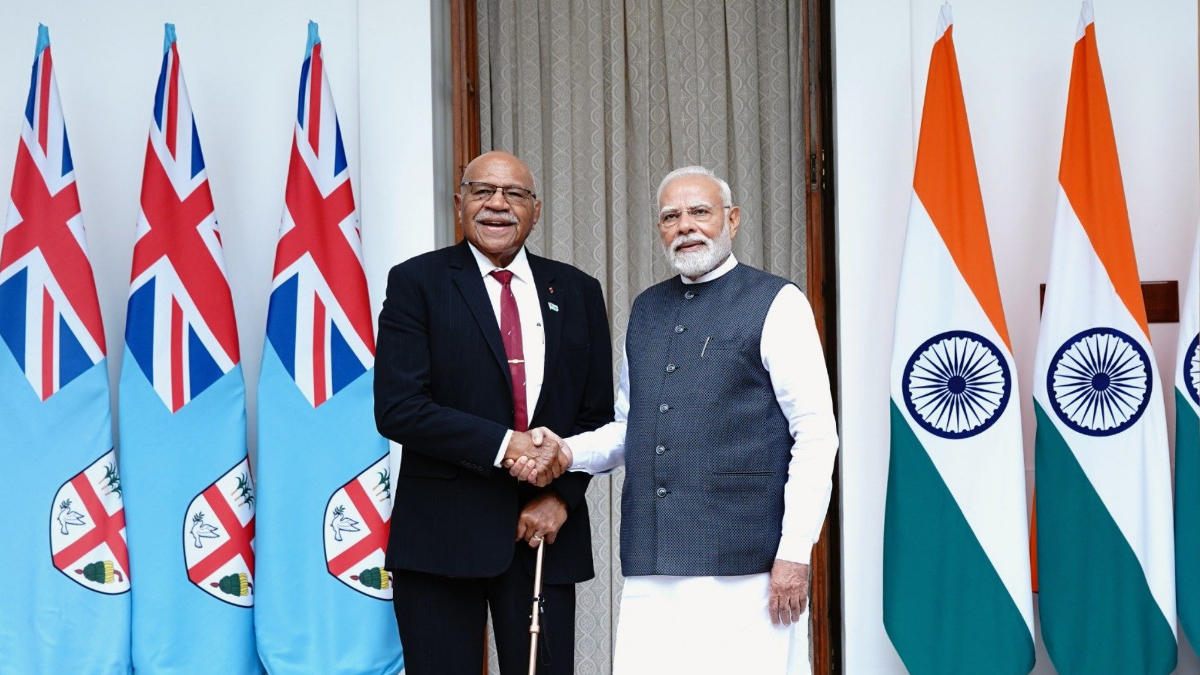India and Fiji, on August 25, 2025, unveiled a comprehensive action plan to strengthen bilateral defence and security cooperation, underscoring New Delhi’s growing engagement with Pacific Island nations. The agreement comes as China continues to expand its strategic footprint in the region.
In New Delhi, Prime Minister Narendra Modi and visiting Fijian Prime Minister Sitiveni Ligamamada Rabuka signed nine agreements and announced 17 additional initiatives, with a strong focus on defence, maritime security, healthcare, and cultural cooperation.
The partnership includes Indian assistance in securing Fiji’s Exclusive Economic Zone (EEZ), reflecting New Delhi’s intention to deepen its role in Indo-Pacific security.
What sort of defence and maritime cooperation are India and Fiji aiming at?
At a joint press briefing, Modi announced that India will provide training, equipment, and capacity-building support to Fiji’s armed forces, along with expertise in cybersecurity and data protection. “India and Fiji may be oceans apart, but our aspirations sail in the same boat. From the Indian Ocean to the Pacific, our partnership is a bridge across the seas,” PM Modi said.
India also confirmed the setting up of a defence wing at its High Commission in Suva, complete with a defence attaché who will cover other Pacific island nations. In addition, two ambulances will be gifted to Fiji’s military, and an Indian naval ship is scheduled for a port call to boost maritime cooperation.
The initiatives follow the first India-Fiji Joint Working Group on Defence, held last month, where New Delhi pledged long-term support for Fiji’s military development.
How do cultural bonds and historical ties work between India and Fiji?
Fiji’s Prime Minister Rabuka, currently on a three-day visit to India, lauded the contributions of Indo-Fijians to Fiji’s economy and stability. “They continue to contribute to Fiji’s growth, economy, and stability,” Rabuka said, acknowledging a community that traces its roots back to over 60,000 indentured labourers sent to Fiji in the 19th century.
PM Modi expressed gratitude to Rabuka for declaring Girmit Day, commemorating the sacrifices and contributions of Indian indentured workers. He also recalled his landmark 2014 visit to Fiji, the first by an Indian prime minister in 33 years, which launched the Forum for India–Pacific Islands Cooperation (FIPIC).
What is Modi’s and Rabuka’s strategic vision for the Indo-Pacific?
Both leaders reaffirmed their support for a free, open, and inclusive Indo-Pacific. Modi praised Rabuka’s “Oceans of Peace” vision, while highlighting Fiji’s central role in India’s Indo-Pacific Oceans Initiative.
Secretary (South) Neena Malhotra emphasised Fiji’s importance as a regional hub, with critical air and shipping connections and active participation in organisations like the Pacific Islands Forum.
What are the healthcare and new initiatives launched this time?
Expanding beyond defence, India announced the establishment of a super-specialty hospital in Fiji, which will cater to the wider Pacific region. Other initiatives include training Fijian priests (pundits) in India and Suva’s approval for the sale of Indian ghee in Fiji.
Rabuka, who previously served as Fiji’s prime minister in the 1990s, has been seen as more receptive to strengthening ties with India during his current tenure. His return to office in 2022 marked a reset in bilateral relations.
“Rabuka’s visit marks a new chapter in our partnership,” Modi said, framing India-Fiji relations as a strategic bridge across the Pacific and Indian Oceans.
